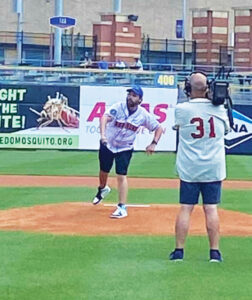
Dominic Rodriguez is spending the last few weeks of his summer preparing for a unique professional adventure: joining Space Force, an independent military branch of the U.S. Air Force..
Dominic graduated in May from Miami (Ohio) University, where he had been part of the ROTC program. He majored in Russian, East European and Asian Studies and speaks Russian fluently. Once commissioned, he had the choice of joining either the Air Force or Space Force.
“I figured I’d take my chances and I will apply to both and hopefully I will get (military) intelligence in the Space Force, which is exactly what I wanted and what I got,” he said. “Honestly, I’m absolutely blown away by it. It’s everything I could have dreamed of and more.”
He will be stationed at Goodfellow Air Force Base in San Angelo, Texas, where he’ll enter nine months of training in military intelligence.
“The Space Force is new and so interesting. There’s so much to be said about the amazing things that they’re doing and what they’re capable of doing,” he said. “I can’t wait to get into my training and the nitty gritty of it.”
The mission of Space Force is to organize, train and equip Guardians to conduct global space operations that enhance the way U.S, joint and coalition forces fight, while also offering decision makers military options to achieve national objectives. Space Force currently has about 8,400 members and 77 spacecraft, making it the smallest of eight military branches.
Space Force organizes and controls global positioning satellites (GPS), military communications satellites, the Boeing X-37B spaceplane, U.S. missile warning system, U.S. space surveillance system, and the satellite control network, and Space Fence, which tracks artificial satellites and space debris in Earth’s orbit.
Dominic won’t know his actual assignment with Space Force until he completes his training.
“I do not know specifically whether I’ll be dealing with satellite targeting or tracking or GPS or anything like that,” he said, while admitting his anticipation and the “hurry up and wait game.”
“Honestly, though, I’m okay with it. It’s nice to spend time with my family, get to hang out with my grandma, my mom and dad some more.”
Not being in the Space Force training class is something Dominic sees as an advantage, because he’ll be able to talk to classmates about their experiences and prepare accordingly. But being the smallest and newest of the armed forces can have its drawbacks, too.
“It has a lot of benefits regarding being more nimble and flexible when it comes to individual needs, but it also means there’s not a lot of guidance available out there when you’re trying to find help on a specific issue,” he admitted. “But I really like being the trailblazer, in a manner.”
Dominic gets to blaze another personal trail this summer before departing for training: throwing out the first pitch during Latino Heritage Day at the Toledo Mud Hens game July 31.
“I’m honestly super excited,” he said. “I’ve never really done anything like this before, so it’s a really cool opportunity.”
Don’t be surprised if he tries to calculate ball velocity, trajectory, wind speed and other factors of flight to make sure the ball crosses home plate for a strike. Dominic has always had a love for aviation and space, even getting the opportunity to attend the Space Camp in Huntsville, Alabama, when he was 12.
He had intended to enter the Army like his father did, but that changed based on his other interests. Space Camp uses astronaut training techniques to engage students in real-world applications of STEM (science, technology, engineering and math). The camp is located near NASA’s Marshall Space Flight Center.
“I got to go fly in flight simulators and I got to participate in a lot of space activities,” he recalled. “They had a chair that simulated the gravity on the moon.
Now it turns out some of things he learned at space camp a decade ago have actual global security implications. It was excellent. The thing that really sticks with me is actually sitting in a replica of the space shuttle and conducting experiments and pretending to fly it. It was hooked up to hydraulics and shook you all around. You had to tackle each problem as they came.”
While in college, he got to experience some of the “behind-the-scenes, up-close and personal history and heritage” of the Air Force Museum located at Wright Patterson Air Force Base in Dayton. Some of his friends in the Russian program were curators at the museum. Those experiences “guided and pushed him” to the decision to pursue Space Force.
“It’s absolutely mind-blowing to me just the sheer impact the space capabilities have in the U.S. and even for the rest of the world,” he said. “It is just completely mind-blowing to me that so many people don’t realize just what relies on space. I ask them: ‘have you ever had to use a map or a compass to find your way?’ They say ‘No, I just rely on GPS.’ What if you would need to? GPS relies on space. No one would think that could be targeted, but Space Force forces us to think about ‘here is a potential threat and how are we going to address it in order to keep the American people safe?’”
Dominic pointed out that people take for granted how much relies on satellites in space, because they use it every day. He stated satellites are responsible for maintaining the grids in the electric and gas industries, which makes those at potential risk. He stated a lot of things portrayed in science fiction in movies and TV are becoming reality, using wrist communicators as an example, because people can now talk into their smart watches.

